高中英语人教新课标必修三unit1 Warming up
人教版高中英语必修三U1warmingupandreading1
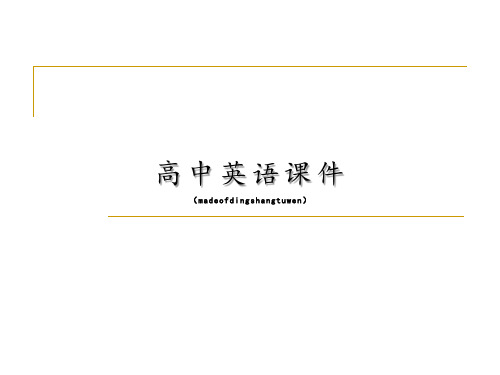
Retell the text by filling the following blanks:
There are all kinds of festivals and _c_el_e_b_r_a_t_io_n_s around the world, which are held for different reasons. The _a_n_c_i_e_n_t __f_e_st_i_v_a_ls_ were mainly held at three times a year--- the end of the cold winter, planting in spring and harvest in autumn.Some festivals are held to h__o_n_o_r the dead or satisfy and _p_l_ea_s_e_ the _a_n_c_e_s_t_o_r_s in case they might __d_o__ __h_a_r_m__, while other festivals are held to honor famous people or the gods, such asD_r_a_g_o_n____ _B__o_a_t __Fe_s_t_iv_a_l_ and Columbus Day.
Eat rice dumplings and watch boat races
Ching Ming Festival
In April
The day we remember our dead relatives
Visit graves
Mother’s Day
In May
zx xk
Spring Festival
人教版高中英语必修三unit1-Warming-up-and-reading
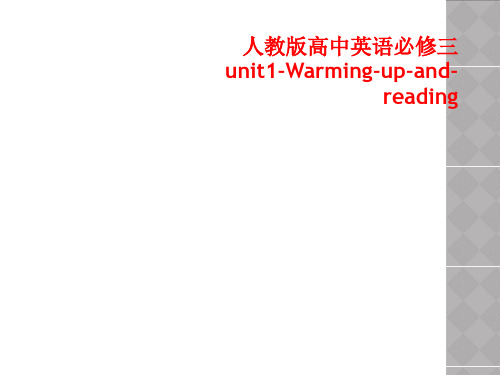
Obon Festivals of the Dead Day of the Dead
Halloween
1. What are festivals of the dead usually for?
Festivals of the dead are usually for honoring the dead or satisfying the ancestors, who (some people believe) might return either to help or to do harm.
Most children are excited on this day. They wear black costumes or masks.
They would like to dress up as frightening and ugly ghosts or witches. They would like to knock at others’ doors and say “Trick or treat”.
Valentine’s Day
February 14th Valentine’s
Valentine’s Day (情人节) is on February 14th.
It is a time to give little gifts,like roses, chocolates, etc. to one’s lover.
Valentine’s Day Easter Halloween Thanksgiving Christmas
14th February 12th April 31st October 26th November 25th December
人教版高中英语必修三unit1period1warmingup

• TheSpringFestivalmaytakeplaceinFebruary.Itison lunar1stofJanuary.
• AttheSpringFestival,peoplehaveplentyoffoodandf ruit,andmaygivechildrenluckymoneyinredpaper.
ear,
eatfishanddu
reunionwith mplings;
familyandre visitfamilym
latives
embers
Festival Timeof Whatitcele Whatpeopledo Year/date brates
National October1 Day
nds
Festival Timeof Whatitceleb Whatpeopled
Year/date rates
o
Spring January Theendofthe Givemoneyin
Festival February winter, redpapertoc LunarNewY hildren;
Easter
InApril ItisthetimewhenJesusC
hristdiedandcamebackt olife. Eatchocolateeggs
Halloween
• 在每年的10月31日是西方传统的“鬼节”—— 万圣节。10月31日是万圣节前夕.通常叫做万圣节 前夜.不过这一天的气氛却远不像它的名称那样让 人听上去就“毛骨悚然”。每当万圣节到来,孩 子们都会迫不及待地穿上五颜六色的化妆服,戴 上千奇百怪的面具,提着一盏“杰克灯”走家窜 户,向大人们索要节日的礼物。万圣节最广为人 知的象征也正是这两样——奇异的“杰克灯”和 不请吃就捣乱(不给糖吃就捣乱)——
人教新课标高一英语必修3Unit1;Warming up and reading课件
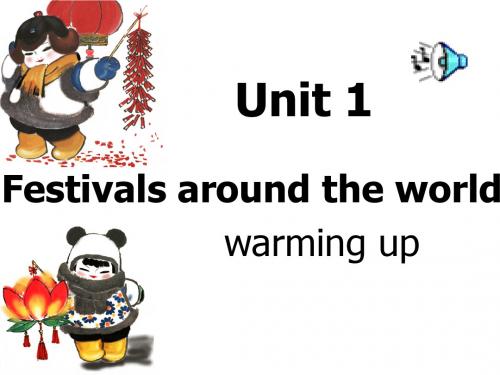
Sugar Skeleton
the Day of the Dead (亡灵节)
It is a traditional festival in Mexico to honor the dead. People light candles at a tomb covered with flowers and food.
Festival
Day
India
China
USA
3.Harvest Festivals
People will ______2__ on Thanksgiving festivals. 1. decorate churches and town halls 2. get together to have meals 3. win awards for their farm produce
Easter
Easter eggs
Easter Bunny In late March or early April Popular symbols
Reading
Fast reading
What’s the main idea of the passage?
diffeTrheentpkaisnsdasgeofmfeasintilvyailnstroduces _______________o_r_ig_i_n_s ______, incceluledbinragttiohnesir __________ and ______________.
Easter is the time of springtime festivals, a time for Christians to celebrate the life and resurrection of Christ. And a time of chocolate bunnies, marshmallow chicks, and colored eggs!
新人教版必修三 Unit 1 Festival around the world单元教案

Festival around the world单元教案人教版新课标必修 3 unit 1教材分析和教材重组教材分析本单元以节日为话题,介绍了世界各地的一些节日、含义、由来和民俗。
通过本单元的学习,可以帮助学生更多地了解节日、体味文化;同时又能教育学生理解、尊重不同的文化和习俗。
通过本单元的语言技能训练,要求学生学会使用请求以及感谢的表达法。
1. Warming Up 要求学生以小组形式完成一个表格填充,列出中国的五个节日和这些节日的时间、庆祝的内容以及节日里人们的所作所为。
激发学生的阅读兴趣,为本单元Reading部分的世界节日做好铺垫。
2. Pre-reading 通过若干个问题了解学生对节日的认识,比如:你最喜欢的节日是什么?你喜欢与家人还是与朋友共度佳节?你喜欢节日的哪部分——音乐、拜访朋友,可看的还是可吃的?3. Reading 由五篇小短文组成,分别介绍古代节日、亡灵节、纪念名人的节日、丰收节和春天的节日等,使学生了解节日的由来及其存在的意义。
最古老的节日主要庆祝冬天的结束,春天的播种,秋天的收获等。
鬼节是为祭奠亡灵,取悦祖先而举行的节日,例如日本的盂兰盆节(Obon),墨西哥的亡灵节,万圣节(Halloween)等。
纪念名人的节日有中国的端午节,美国的哥伦布日,印度的甘地纪念日。
春天的节日包括中国的春节,西方的狂欢节、复活节,日本的樱花节。
4. Comprehending 第一部分提出的6个问题让学生对所读文章有一个浅层理解。
第二部分要求学生讨论哪些节日是最重要的,哪些是最有趣的,结合所读文章和自己的想法填表。
第三部分要求找出各个节日中共有的三件事,然后与同伴讨论为什么这些事情对各地的人们都是重要的。
这一任务不仅使学生重温所读文章的内容,而且结合他们的实际,给学生机会阐述自己的想法和观点,挖掘学生的思维潜力。
这3个练习的设置由表及里,由浅入深,非常科学。
5. Learning about Language 主要突出本单元的重点词汇和主要语法项目。
人教新课标高中英语必修三Unit 1 Festivals around the world全章教案

人教新课标高中英语必修三Unit 1 Festivals around the world全章教案I.教学内容分析本单元的中心话题是“节日”,主要讲述了不同地区不同种类的节日。
Warming Up部分设计了小组活动,通过图表填写让学生区分中国的传统节日与别国节日的异同,目的在于激活学生已有的节日背景知识,引出主题,为以后几堂课学习热身。
Pre-reading 通过几个问题,调动学生已有的知识和经验,激发学生想了解更多节日的好奇心,让他们主动参与到主题教学活动中,为下面学习阅读文章作铺垫。
Reading 部分先简要介绍了一下早期各种节日的起源以及存在的原因,然后又分别介绍了几种世界各地的节日,依次的顺序是亡灵节、纪念名人的节日、丰收节、春天的节日等。
Comprehending由四个部分组成。
第一、三、四部分通过表格形式,第二部分通过让学生回答问题的方式,鼓励学生积极思考,加深对课文的理解。
Learning about Language 部分主要突出了本单元的语法项目——情态动词的用法。
这些情态动词主要有:can,could,may,might,will,would,shall,should,must,can’t 等的用法。
Using Language 部分中包括了听、说、读、写几个部分的内容。
学生可通过对Trinidad Carnival、情人节等一些节日的学习,分析问题,锻炼自己的思维能力。
阅读后的习题及讨论不仅帮助学生理解文章的主旨大意,更重要的是让学生寻找解决问题的方法。
Learning Tip部分主要建议学生搜集各种资料,查询与世界各地节日有关的信息,了解各种节日的来源与内涵。
II.教学重点和难点1. 教学重点(1) 本单元的生词和短语;(2) 掌握一些情态动词的基本用法;(3) 了解有关节日和民俗,掌握有关词汇,如custom,religious等。
2. 教学难点(1) 增进学生对中国节日的理解,了解和感悟外国的节日;(2) 提高学生的社会文化素质,加强跨国文化素质;(3) 培养学生运用资源策略。
必修三unit1warmingupandReadingI

Spring Festival
Carnival Easter Cherry Blossom Festival
Countries
Japan Mexico
China USA India
Tips : My favourite … is … I like … best. I prefer …. I enjoy/like….
Spring
Festival
Spring Festival couplets
FESTIVALS AND CELEBRATIONS
Reading-I (5m)
Fast reading
China/Japan China
Japan
1. How many parts is the passage divided into? Six parts.
2. Which festivals are mentioned in the passage?
Festivals
Obon Day of the Dead
Halloween Dragon Boat Festival
Easter
Christmas
Carnival
festivals
Father’s Day
Mother’s Day
Halloween
Valentine’s Day Fool’s Day
Warming up-II(3m)
Choose one of the festivals, and think about: (1)When the festival comes (2)What people should do or should not do (3)Why the festival is liked by people Fruit Date Food Work
新人教版必修三Unit1Festivalaroundtheworld单元教案
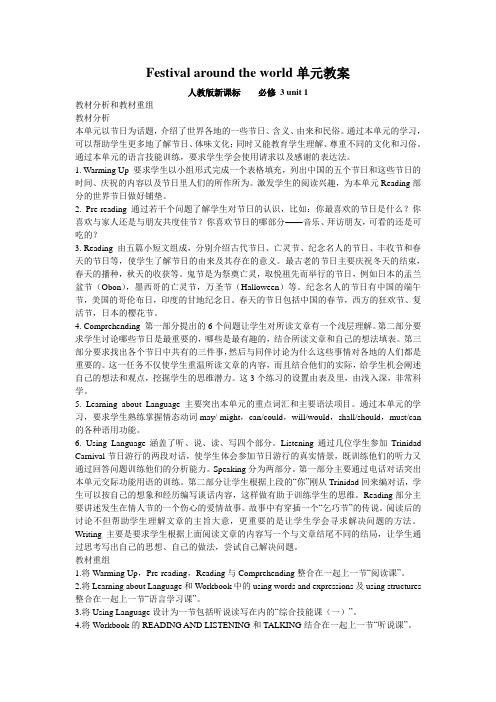
Festival around the world单元教案人教版新课标必修 3 unit 1教材分析和教材重组教材分析本单元以节日为话题,介绍了世界各地的一些节日、含义、由来和民俗。
通过本单元的学习,可以帮助学生更多地了解节日、体味文化;同时又能教育学生理解、尊重不同的文化和习俗。
通过本单元的语言技能训练,要求学生学会使用请求以及感谢的表达法。
1. Warming Up 要求学生以小组形式完成一个表格填充,列出中国的五个节日和这些节日的时间、庆祝的内容以及节日里人们的所作所为。
激发学生的阅读兴趣,为本单元Reading部分的世界节日做好铺垫。
2. Pre-reading 通过若干个问题了解学生对节日的认识,比如:你最喜欢的节日是什么?你喜欢与家人还是与朋友共度佳节?你喜欢节日的哪部分——音乐、拜访朋友,可看的还是可吃的?3. Reading 由五篇小短文组成,分别介绍古代节日、亡灵节、纪念名人的节日、丰收节和春天的节日等,使学生了解节日的由来及其存在的意义。
最古老的节日主要庆祝冬天的结束,春天的播种,秋天的收获等。
鬼节是为祭奠亡灵,取悦祖先而举行的节日,例如日本的盂兰盆节(Obon),墨西哥的亡灵节,万圣节(Halloween)等。
纪念名人的节日有中国的端午节,美国的哥伦布日,印度的甘地纪念日。
春天的节日包括中国的春节,西方的狂欢节、复活节,日本的樱花节。
4. Comprehending 第一部分提出的6个问题让学生对所读文章有一个浅层理解。
第二部分要求学生讨论哪些节日是最重要的,哪些是最有趣的,结合所读文章和自己的想法填表。
第三部分要求找出各个节日中共有的三件事,然后与同伴讨论为什么这些事情对各地的人们都是重要的。
这一任务不仅使学生重温所读文章的内容,而且结合他们的实际,给学生机会阐述自己的想法和观点,挖掘学生的思维潜力。
这3个练习的设置由表及里,由浅入深,非常科学。
5. Learning about Language 主要突出本单元的重点词汇和主要语法项目。
人教版高中英语必修3人教版必修三Unit1Festivals around the world教案Period 1 Warming up and Reading
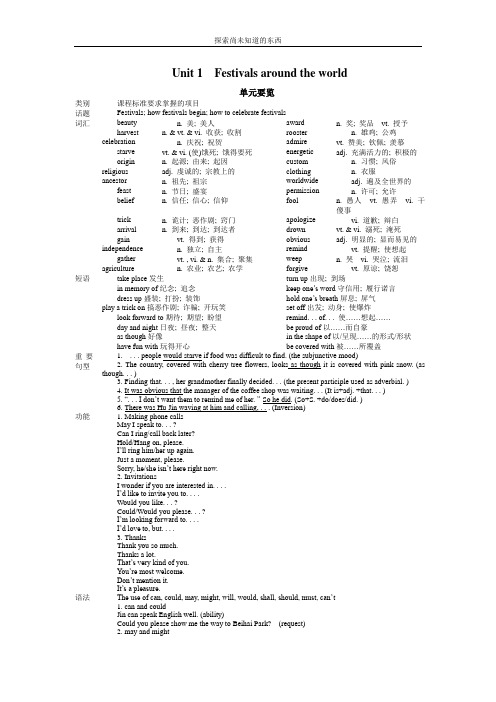
Unit 1Festivals around the world单元要览类别课程标准要求掌握的项目话题Festivals; how festivals begin; how to celebrate festivals词汇beauty n. 美; 美人award n. 奖; 奖品vt. 授予harvest n. & vt. & vi. 收获; 收割rooster n. 雄鸡; 公鸡celebration n. 庆祝; 祝贺admire vt. 赞美; 钦佩; 羡慕starve vt. & vi. (使)饿死; 饿得要死energetic adj. 充满活力的; 积极的origin n. 起源; 由来; 起因custom n. 习惯; 风俗religious adj. 虔诚的; 宗教上的clothing n. 衣服ancestor n. 祖先; 祖宗worldwide adj. 遍及全世界的feast n. 节日; 盛宴permission n. 许可; 允许belief n. 信任; 信心; 信仰fool n. 愚人vt. 愚弄vi. 干傻事trick n. 诡计; 恶作剧; 窍门apologize vi. 道歉; 辩白arrival n. 到来; 到达; 到达者drown vt. & vi. 溺死; 淹死gain vt. 得到; 获得obvious adj. 明显的; 显而易见的independence n. 独立; 自主remind vt. 提醒; 使想起gather vt. , vi. & n. 集合; 聚集weep n. 哭vi. 哭泣; 流泪agriculture n. 农业; 农艺; 农学forgive vt. 原谅; 饶恕短语take place发生turn up出现; 到场in memory of纪念; 追念keep one’s word守信用; 履行诺言dress up盛装; 打扮; 装饰hold one’s breath屏息; 屏气play a trick on搞恶作剧; 诈骗; 开玩笑set off出发; 动身; 使爆炸look forward to期待; 期望; 盼望remind. . . of. . . 使……想起……day and night日夜; 昼夜; 整天be proud of以……而自豪as though好像in the shape of以/呈现……的形式/形状have fun with玩得开心be covered with被……所覆盖重要句型1. . . . people would starve if food was difficult to find. (the subjunctive mood)2. The country, covered with cherry tree flowers, looks as though it is covered with pink snow. (as though. . . )3. Finding that. . . , her grandmother finally decided. . . (the present participle used as adverbial. )4. It was obvious that the manager of the coffee shop was waiting. . . (It is+adj. +that. . . )5. “. . . I don’t want them to remind me of her. ” So he did. (So+S. +do/does/did. )6. There was Hu Jin waving at him and calling, . . . (Inversion)功能 1. Making phone callsMay I speak to. . . ?Can I ring/call back later?Hold/Hang on, please.I’ll ring him/her up again.Just a moment, please.Sorry, he/she isn’t here right now.2. InvitationsI wonder if you are interested in. . . .I’d like to invite you to. . . .Would you like. . . ?Could/Would you please. . . ?I’m looking forward to. . . .I’d love to, but. . . .3. ThanksThank you so much.Thanks a lot.That’s very kind of you.You’re most welcome.Don’t mention it.It’s a pleasure.语法The use of can, could, may, might, will, would, shall, should, must, can’t1. can and couldJin can speak English well. (ability)Could you please show me the way to Beihai Park? (request)2. may and mightMay we see the awards for the teams? (permission; request)She might give you some new clothing. (possibility)3. will and wouldThe Spring Festival is the most fun. The whole family will come for dinner. (promise; agreement) Often he would dress up like a rich man. (past habit; custom)4. shall and shouldThe harvest festival begins on Sunday. We shall be there with our friends. (promise; agreement) You should arrive at the airport two hours before he goes. (advice)5. must and can’tWang Feng wins an award every year. He must be very strong. (speculation)You must be joking. That can’t be true. (guessing)教学重点1. Get students to know about festivals around the world.2. Have students learn some useful new words and expressions about festivals and customs and let them learn effective ways to remember English vocabulary.3. Enable students to grasp and use the expressions of request and thanks.4. Let students learn the new grammar item: the use of can, could, may, might, will, would, shall, should, must and can’t.5. Develop students’ listening, speaking, reading and writing abilities.教学难点1. Enable students to master the use of can, could, may, might, will, would, shall, should, must and can’t.2. Let students learn to write a different ending of a story.3. Develop students’ integrative skills.课时安排Periods needed: 7Period 1 Warming up and readingPeriod 2 Learning about language: Important language points Period 3 Learning about language: GrammarPeriod 4 Using language: Listening and speakingPeriod 5 Using language: Extensive readingPeriod 6 Using language: Speaking and writingPeriod 7 Revision: Summing up and learning tipPeriod 1Warming up and reading整体设计教材分析This is the first teaching period of this unit. At the beginning of the class, the teacher can lead in the topic of the unit by having a free talk with students about their winter holidays and the Spring Festival.The Warming Up is intended to have students start thinking about the variety of events and festivals that are celebrated in China, and connect them with seasons of the year and reasons for the celebrations. The teacher can use this part to introduce information that Chinese students should have about their country’s cultural events.The Pre-reading is a continuation of the Warming Up and it moves the discussion to a more personal level. It is intended to help students enter imaginatively into a discussion of festivals and their importance to the society. It also directs their attention to the variety of events and activities those festivals include. The teacher should let students discuss the questions and predict what kind of information will be introduced in the Reading.The reading passage titled FESTIV ALS AND CELEBRATIONS briefly describes the earliest kinds of festivals with the reasons for them, and then four different kinds of festivals that occur in most parts of the world. Encourage students to look at the pictures and the heading of each section to guess what the text might be about. Then let them skim for the general idea for each section, and scan for further understanding. Because this passage introduces a lot of useful new words and expressions which are only used for festivals, in order not to let students feel much difficult, the teacher should deal with any language problems while they are reading. After reading, students are required to do the four exercises in the Comprehending to see how much they have understoodthe reading passage. The teacher can first let them work in pairs or in groups to find the answers cooperatively, and then check their answers with the whole class.To consolidate the contents of the reading passage, students should be required to talk about festivals in their own words at the end of the class. In order to arouse students’ interest, the teacher can hold a competition between groups.教学重点1. Let students learn more about history and basic knowledge of festivals.2. Get students to learn different reading skills.教学难点1. Develop students’ reading ability.2. Enable students to talk about festivals and celebrations.三维目标知识目标1. Get students to learn the useful new words and expressions in this part: beauty, harvest, starve, origin, religious, ancestor, Mexico, feast, bone, belief, poet, arrival, gain, independence, gather, agriculture, award, rooster, admire, energetic, Easter, clothing, Christian, custom, take place, in memory of, dress up, play a trick on, look forward to, day and night, as though, have fun with2. Let students learn about history and basic knowledge of festivals both in and out of China.能力目标1. Develop students’ reading ability and let them learn different reading skills.2. Enable students to talk about festivals and celebrations.情感目标1. Stimulate students’ love for their own national culture and customs.2. Develop students’ sense of cooperative learning.教学过程设计方案(一)→Step 1 Leading-inHave a free talk with students. Ask them the following questions:Did you have a good time in your winter holidays?When did you feel most happy and excited? Why?(At the Spring Festival. Because it’s the most important festival in our country. . . )→Step 2 Warming up1. Let students brainstorm the other Chinese festivals.(Lantern Festival, Pure Brightness Festival, Dragon Boat Festival, Mid-Autumn Festival, New Year’s Day, Chung Yeung Festival. . . )2. Let students read the information about Chinese festivals below and discuss another three Chinese festivals:When does the festival come?What do people celebrate?What do people do?Festivals Date Festivals DateNew Year January 1st Teachers’ Day September 10thInternational Women’sDayMarch 8th National Day October 1stArbor Day March 12th The Spring Festival Lunar New YearInternational Labor Day May 1st Dragon Boat Festival the fifth day of the fifth lunar month International Children’sDayJune 1st Mid-Autumn Festival the 15th day of the 8th lunar month Army Day August 1st Lantern Festival the 15th day of the 1st lunar month Chinese Youth Day May 4th Pure Brightness Day April the fifth3. Ask students to fill in the following form and ask some to share their opinions with the whole class. The first one is given as an example.Festivals Time of year/date What it celebrates What people doMid-Autumn Festival autumn/fall the beauty of the fullmoon, harvest, time withfamily and friends give/eat moon cakes and watch the full moon with family and friends4. Talk about some foreign festivals with students.(Christmas, April Fools’ Day, Easter, Halloween, Valentine’s Day, Thanksgiving Day, . . . )→Step 3 Pre-reading1. Let students discuss the following questions:What festivals or celebrations do you have in your city or town? What part of a festival do you like best—the activities, the music, the sights, the food or the people who visit?2. Ask students to look at the pictures and title of the passage in Reading. Discuss in pairs what kind of information will be introduced in the passage.→Step 4 Reading1. Fast readingAsk students to skim the reading passage and then fill in the following chart.Kinds of Festivals Names of Festivals Countries FestivalsFestivalsHarvestSpring(Let students look through the chart and then read the text silently. Three minutes later, check the answers with the whole class. Show the suggested answers on the screen. )2. Intensive readingAllow students to read carefully this time to understand the main ideas of each paragraph and the important details, and then finish the following:1)Choose the best answer to each question or to finish each sentence according to the text.(1)Why do Japanese people light lamps during the Festival of the Dead?A. Because they want to make the festival colorful.B. Because they want to light up their rooms.C. Because they want to light up their way.D. Because they want to lead their ancestors to return to earth.(2)Which of the following was not mentioned as a famous person in the text?A. Mohandas Gandi.B. Christopher Columbus.C. Abraham Lincoln.D. Qu Yuan.(3)The place where people will usually decorate churches and town halls with flowers andfruits is ______________.A. IndiaB. AmericaC. EuropeD. China(4)Easter is held in memory of the return of Jesus for Christians and also celebrates ______________.A. the coming of springB. the autumn harvestC. the Lunar New YearD. the end of a yearSuggested answers: (1)D(2)C(3)C(4)A2)Use the information from the reading passage to answer the following questions.(1)What are festivals of the dead usually for?(2)What makes autumn festivals happy events?(3)What do people usually do at spring festivals?(4)What is one important reason to have festivals and celebrations?(5)Compare the festivals of the dead in Mexico, Japan and China. What things are similar? What things are different?3. Reading and discussionRead the text a third time and then work in pairs to do the following.1)Based on the reading passage, what do most festivals seem to have in common? Why do you think these things might be important to people everywhere? Talk with your partner and fill in the chart below.Three common things Reasons why they are important to people everywhere1.2.3.2)Discuss in pairs which festivals you think are the most important and which are the most fun. Then fill in the chart with your ideas.Type of festival Example of festival Reasons for your choice Most importantMost fun(Let students have enough time to read the passage carefully and discuss the questions and charts with their partners. Encourage them to expand their answers according to their own experiences. )4. ExplanationHelp students analyze some difficult, long and complex sentences and guess the meanings of some new words. Encourage them to try to deal with the language points in the context.Discuss the following important sentences and phrases in the passage.1)Some festivals are held to honour the dead, or to satisfy the ancestors, who might return either to help or to do harm.2)in memory of3)India has a national festival on October 2 to honour Mohandas Gandhi, the leader who helped gain India’s independence from Britain.4)People are grateful because their food is gathered for the winter and the agricultural work is over.5)The most energetic and important festivals are the ones that look forward to the end of winter and to the coming of spring.6)The country, covered with cherry tree flowers, looks as though it is covered with pink snow.Suggested explanations:1)The sentence contains a non-restrictive attributive clause who might return either to help or to do harm. It means people hold some festivals either to show respect to the dead or to make their ancestors happy in case they might come back to do harm.2)in memory of: serving to recall sb. , to keep him fresh in people’s mindsHe wrote a poem in memory of his dearest wife, who died in an accident.in honor of: showing great respect or high public regard3)the leader who helped gain India’s independence from Britain: a noun phrase followed by an attributive clause as the appositive4)two clauses for reason5)energy n. → energetic adj. : full of or done with energylook forward to: “to” is a preposition here.I’m looking forward to hearing from you.be devoted to; be/get used to; get down to; stick to. . .6)covered with cherry tree flowers: a past participle phrase equal to “which is covered with cherry tree flowers”as though: as ifHe talks as though he knew all about it.He looks as if he had seen a ghost.5. Reading aloud and underliningAsk students to read the passage aloud to the tape and let them pay attention to the pronunciation of each new word and the pauses within each sentence. Tell them to pick out all the useful expressions or collocations from the passage while reading and copy them to the notebook after class as homework.→Step 5 ConsolidationAsk students to talk about festivals in their own words according to the text. Then let them complete the following passage with proper words or phrases.There are all kinds of festivals and ______________ around the world, which are held for different ______________. The ancient festivals were mainly held at three times a year—the end of the cold ______________, planting in spring and ______________ in autumn. Some festivals are held to ______________ the dead or ______________ the ancestors, who might return either to help or ______________, while other festivals are held to honor famous people or to the ______________, such as Dragon Boat Festival, Columbus Day, and so on. Harvest and ______________ festivals are happy events because their food is ______________ for the winter and the ______________ work is over, to which Mid Autumn Festival belongs. And the most ______________ and important festivals are the ones that ______________ the end of winter and to the coming of ______________ such as the Lunar New Year, at which people have a very ______________.Suggested answers: celebrations; reasons; weather; harvest; honor; to satisfy; to do harm; gods; Thanksgiving; gathered; agricultural; energetic; look forward to; spring; good time→Step 6 Homework1. Learn the useful new words and expressions in this part by heart.2. Read the reading passage again and again and try to talk about festivals both in and out of China.设计方案(二)→Step 1 Leading in the topic by learning vocabulary about festivals1. Make a circle on the blackboard and write the word “FESTIV AL” in it.2. Ask students, “We have learned ‘festival’. Can you name some festivals? ”3. Students list as many fest ivals as possible. Then the teacher adds some students can’t think of, such as Halloween, Easter, Thanksgiving, Valentine’s Day.4. Let students read them aloud and try to learn them by heart.→Step 2 Warming up by talking about festivalsWork in groups and list three more Chinese festivals that you know. Discuss when they take place, what they celebrate and what people do at that time. Then tell the group which festival is their favorite and why.Festivals Time of year/date What it celebrates What people doMid-Autumn Festival autumn/fall the beauty of the fullmoon, harvest, time withfamily and friends give/eat moon cakes and watch the full moon with family and friends→Step 3 Predicting by looking and discussing1. Look at the pictures and title of the reading passage and discuss in pairs what the passage might be about.2. Two or three students are to give their opinions.→Step 4 Reading1. Give students 2 minutes, and ask them to skim the passage for information to tell if the following sentences are True or False.1)The ancient people needn’t worry about their food. (F)2)Halloween used to be a festival intended to honor the dead. (T)3)Qu Yuan was a great poet who people honor a lot in China. (T)4)The Mid-autumn Festival is held to celebrate the end of autumn. (F)5)Easter celebrates the birth of Jesus. (F)2. Give students 5 minutes to read the passage carefully, and complete the chart according to the passage.Festivals of the Dead Obon in Japan___________________HalloweenFestivals to Honor People ________________________________A national festival in____________Harvest Festivals _________ in European countries_________ in China and JapanSpring Festivals ________________Carnivals in some Western countries________________________________ in Japan3. Listening and reading aloudPlay the tape of the text for students and let them pay attention to the pronunciation of each new word and the pauses within each sentence. Then ask them to read the text aloud to the tape.→Step 5 Closing down by spoken practice1. Have students get prepared in 3 minutes or so and then ask them to talk about festivals and celebrations.2. Ask as many students as possible to have a try in front of the class.→Step 6 Homework1. Go over the text and try to learn all the useful words and expressions in this part by heart.2. Finish the exercises in Comprehending on Page3.板书设计Unit 1Festivals around the worldFestivals and celebrationsKinds of Festivals Names of Festivals Countries FestivalsFestivalsHarvestSpring活动与探究Group discussion & speechAs is known from the reading passage, festivals of all kinds are celebrated around the world. Most festivals have celebrations that include food, music, clothing and dances. These events originated from some similar ideas, but they take different forms in different regions and societies. What festivals and celebrations do you know all over the world? Have you ever taken part in them and enjoyed yourself? Discuss festivals in groups and then make speeches.Step 1: The teacher divides the class into four groups and gives the tasks to students in each group. Group 1 will list the festivals around the world as many as possible, and then categorize them according to the origins of these festivals. And they should prepare for a short speech. Group 2 will discuss two traditional Chinese festivals and prepare for their presentation. Group 3 will discuss two Western festivals and prepare for their presentation. Group 4 will discuss the differences between Chinese festivals and Western festivals, then contrast and compare their styles, celebrations, dates and so on. And they should prepare for a short speech.Step 2: Groups 1, 2 and 3 give their speeches on the festivals they have discussed. Group 4 gives their speech on the differences between Chinese festivals and Western festivals.Step 3: The teacher makes proper remarks about students’ speeches and sums up the different cultural practices between China and other countries according to them.。
高中英语必修三UNIT1Warming up
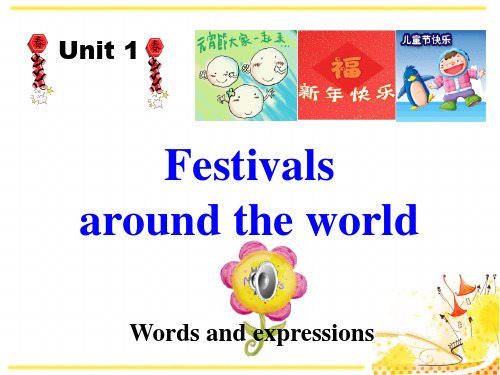
Thank you.
15th day of the eighth lunar month
National Day
1st day of October
Teachers’ Day 10th day of September
Brainstorming
Foreign Festivals &Celebrations Thanksgiving Day Easter Christmas Carnival
festivals
Halloween
Mother’s Day Valentine’s Day
Fool’s Day
Foreign Festivals &Celebrations
Guess and say something about these festivals according to the pictures below.
Fool’s Day
April 1st
Mother’s Day
the second Sunday in May
1. What’s your favourite holiday? Why? Give your reasons. 2. What festivals or celebrations do you have in your city or town?
What part of activities you like best
Homework
1. Write a passage about your favourite Chinese festival in about 150 words. 2. Preview the reading: Festivals and Celebrations
必修3unit1 warming up

他看上去好像对这个地方很熟悉/知道观 众的反应/受到了惊吓
• He looked as though he was very familiar with this place/he knew the audience’s response/he was frightened
I remember it all as though it were yesterday .
• 她下定决心减肥,最终,她成 功地饿了自己一个星期。
• She made up her mind to reduce her weight. Finally, she successfully starved herself for a week
Origin:N起源
• Though the origin of the universe is gradually forgotten, it still remains a mystery.
• 他不得不称赞她惊人的智慧和勇气
• He couldn’t help admiring her for her amazing wisdom and courage
Energetic:ADJ充满活力的/积极的
• 政府将积极保护野生动物免受伤害。
• The government will play an energetic role in protecting wild animals from harm.
Custom:N习俗
• 依据当地的习俗,所有死者须在24小时内掩埋完 毕。
• According to the Local custom, the dead are buried within 24 hours.
Worldwide:ADJ
必修三unit 1 Warming up
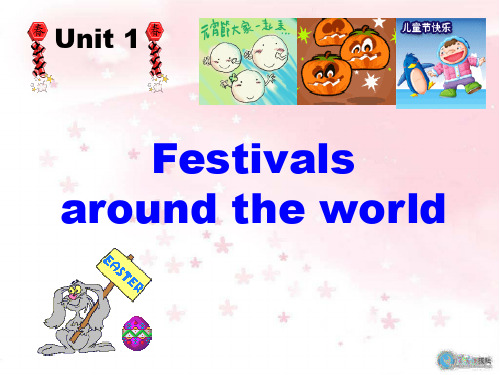
celebrations of ____________and also the
Subtitles (子标题) appear after titles and give you
more information about
return to the table
Festival Time of year / date Dragon the fifth Boat day of the Festival fifth / month in Duanwu lunar Festival calendar
What it celebrates the memory of the beloved poet Qu Yuan who died in 278 BC
What people do
eat zongzi; watch dragon boat races; throw rice wrapped in reed leaves into water in memory of Qu Yuan; put herbs on doorways for good health
What it year / date celebrates
What people do take time off work; travel to visit family or to see other parts of China; go shopping
National October 1 the founding Day of the People’s Republic of China in 1949
the text than the titles. If a text has subtitles , read them first.
高中英语必修三教学课件Unit 1 Warming up

Chong Yang Festival
Next question
People send roses and cards to the people they love.
Valentine's Day Halloween's Day
Mother's Day
Next question
It is on the third Sunday in June.
Easter
In April It is the time when
Jesus Christ died and came back to life. Eat chocolate eggs
Dragon Boat Festival
• In June • The day that the poet
Father's Day Mother's Day
Dragon Boat Festival
Next question
We watch dragon dances and get lucky money.
New Year
Dragon Boat Chinese New Year Festival
Discussing My favourite festival
Qu Yuan died • Eat rice dumplings
and watch boat races
Mother’s Day
• In May
• We give flowers and presents to our mothers.
Free talking
Based on the reading passage, what do most festivals seem to have in common?
人教版高一英语必修三课件:UNIT 1Warming up(共15张PPT)

National October Day 1
Dragon The 5th The memory of the Eat zhongzi; watch Boat day of beloved poet Qu dragon boat races; Festival/ the 5th Yuan who died in throw rice wrapped Duanwu month in 278 BC in reed leaves into Festival lunar water in memory of calendar Qu Yuan; put herbs on doorways for good health.
Unit 1
Festivals around the world Warming up
• Teaching aims: • To know some meanings of different festivals, springs and customs. • To think about the variety of events and festivals in the world. • Learn some new words on festivals and customs and how to use, what they celebrate and what people do at that time.
Festival
Time
What it celebrates
What people do
Mid- Autumn / The beauty of the Give/Eat mooncakes Autumn full moon, harvest, and watch the full fall Festival time with family moon with family and friends. Spring January/ The end of winter, Give money in red Festival February arrival of spring, paper to children; see Lunar New Year, dragon dances; eat reunion with fish, prawns and family dumplings; visit family members.
英语必修三Unit 1 Warming up
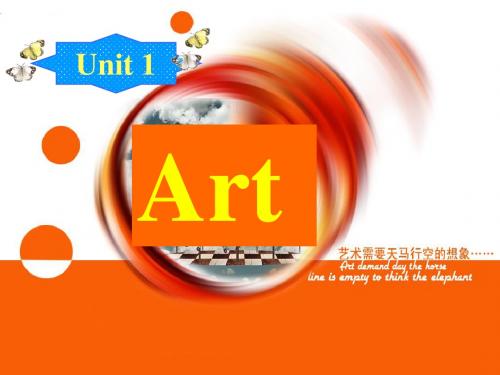
Chinese Folk Art —— New Year Graphics (年画)
traditional
rich colour
simple shape
Chinese Folk Art ——
Wood carving (木雕)
nature
Chinese Folk Art ——
Paper cutting (剪纸)
Discussion
How do you like the paintings? Would you like to choose some to realistic abstract nature decorate yourtraditional orline not? detailed room? Why why Which would religious Chinese-style you prefer, rich paintings or Western-style paintings in unfinished your room? Give your reasons.
Here’s some words you may use to express yourself.
modern colour
shape
Brainstorming
painting
painter
List as many paintings and painters as you can.
Match the paintings and the painters
architecture
sculpture
movie
literature
calligraphy
painting
高一英语人教必修三Unit 1 Warming Up
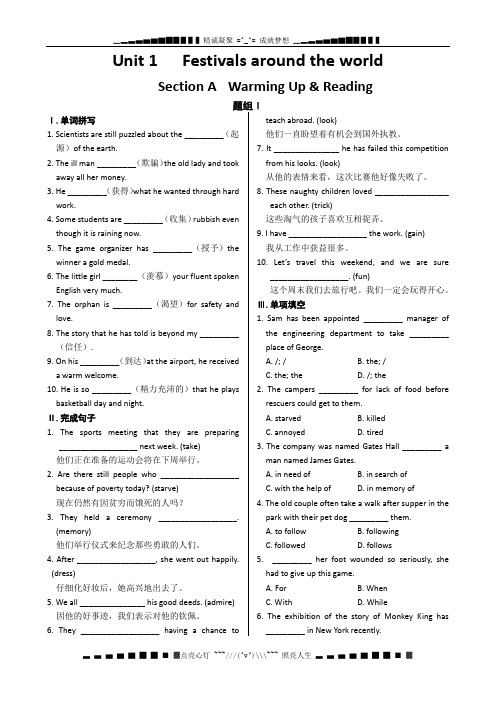
Unit 1 Festivals around the world Section A Warming Up & Reading题组ⅠⅠ.单词拼写1. Scientists are still puzzled about the _________(起源)of the earth.2. The ill man _________(欺骗)the old lady and took away all her money.3. He _________(获得)what he wanted through hard work.4. Some students are _________(收集)rubbish even though it is raining now.5. The game organizer has _________(授予)the winner a gold medal.6. The little girl ________(羡慕)your fluent spoken English very much.7. The orphan is _________(渴望)for safety and love.8. The story that he has told is beyond my _________(信任).9. On his _________(到达)at the airport, he receiveda warm welcome.10. He is so _________(精力充沛的)that he plays basketball day and night.Ⅱ.完成句子1. The sports meeting that they are preparing__________________ next week. (take)他们正在准备的运动会将在下周举行。
- 1、下载文档前请自行甄别文档内容的完整性,平台不提供额外的编辑、内容补充、找答案等附加服务。
- 2、"仅部分预览"的文档,不可在线预览部分如存在完整性等问题,可反馈申请退款(可完整预览的文档不适用该条件!)。
- 3、如文档侵犯您的权益,请联系客服反馈,我们会尽快为您处理(人工客服工作时间:9:00-18:30)。
It _____ to me that she didn't know I had moved into the new house. I was walking along the street looking for a place to park when the accident _____ It‘s already 10 o’clock ,I wonder how it _______ that she was two hours late on such a short trip.
Festival Time of What it year/date celebrates
the end of Spring January/ winter, Festival February arrival of spring, Lunar New Year, reunion with family and relatives
A in the rural areas in Great changes _____ the last two decades. A. have taken place B. took place C. have been taken place D. are happening 解析: take place 不能用于被动语态中, 句中 短语in the last two decades 可确定句子的 时态为现在完成时。
Halloween
Mother’s Da Fool’s Day y Valentine’s Day
Choose one of the festivals, and discuss it with your partner. 1. When the festival is;
2. What the festival celebrates; 3. What people should do or should not do.
2. Discuss when they take place, what they celebrate and what people do at that time. 讨论它们(中国节日)什么时间进行, 庆祝的 是什么事件, 和人们在那天所做的事。 take place 发生; 举行 The performance didn’t take place after all. 演出终于没有进行。 Was there anybody passing by when the accident took place? 事故发生时, 有人路过那里吗?
The 15th day of the eighth lunar month
Teachers’’ Day
The 10th day of September
National Day
The 1st day of October
In China
The Double Ninth Festival Tomb Sweeping Day
5) be meant forபைடு நூலகம்
“打算给予; 打算作……用”。
In some parts of London, missing a bus means _____ A for another hour. A. waiting B. to wait C. wait D. to be waiting 句意为: 在伦敦的一些地方, 错过一班 公共汽车意味着再等一个小时。
The fourth Thursday in November
Halloween 万圣节
November 31st
Christmas
In foreign countries
Easter
Thanksgiving Day Christmas Father’ s Day
Carnival
festivals
Festivals are meant to celebrate important times of year. Different countries have different festivals. Work in groups and list below three more Chinese festivals that you know.
Which is the greatest and the most important festival to Chinese people? Spring Festival
Which is the greatest and the most important festival to Christian people in Western countries? Christmas
The Spring Festival
The Double Seventh Festival
festivals
The Lantern Festival
The Dragon Boat Festival
The Middle Autumn Festival
Valentine’s Day
Carnival (狂欢节)
Festival Time of year/ date Midautumn Autumn /fall Festival
What it celebrates
What people do
the beauty of give and eat the full moon, mooncakes, harvest, time watch the full with family moon with and friends family and friends
What is known to us all is that the 2008 Olympic Games will _____ in Beijing. Great changes have _____ in that school. It is no longer what it was 20 years ago, when it was so poorly equipped. —Tom is never late for work. Why is he absent today? —Something must ________ to him.
辨析: take place, happen, occur, break out, come about 1) take place 相当于不及物动词, 没有被动语态, 指 事先计划或预想到的事情的发生。 我们学校的运动会将于下周三举行。 Our school sports meeting is going to take place next Wednesday. 2)happen 也是不及物动词, 没有被动语态, 指一切 客观事物或情况的偶然或未能预见的发生, 可以和to 连用或接that引导的从句。 他碰巧没有读过那部小说。 He happened not to have read the novel.
In February
Easter 复活节
The first Sunday after a full moon on or after March 21
Fool’s Da y
April 1st
Mother’s Day
The second Sunday in May
Thanksgiving Day
What people do
give money in red paper to children; see dragon dances; eat fish, prawns and dumplings; visit family members
Festival Time of
What it year/date celebrates the founding of the People’s Republic of China in 1949
疾病之类事情的突然发生, 同样也不用于被动句中。 发生了大火/战争爆发了。 A fire / war broke out.
5) come about 属于中性词组, 既可用于表达正面
事情的发生, 又可用于表达负面事情的发生。
你能告诉我事故是怎样发生的吗?
Can you tell me how the accident came about.
Both of them are quite popular around the world. Can you tell the similarities and differences between them?
1. Festival are meant to celebrate important times of year. 1) mean doing sth. “意味着(必须要做某事或 导致种结果)”, 其主语通常是指事物的词。
高一人教新课标版必修三
Unit 1 Festivals around the world
Warming up
Brainstorming How many festivals do you know both in and out of
